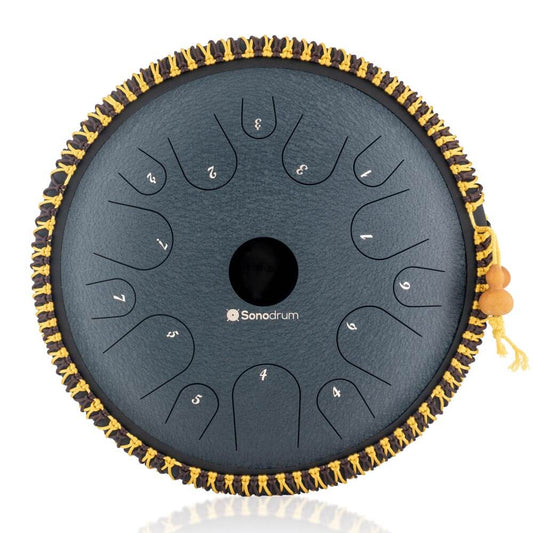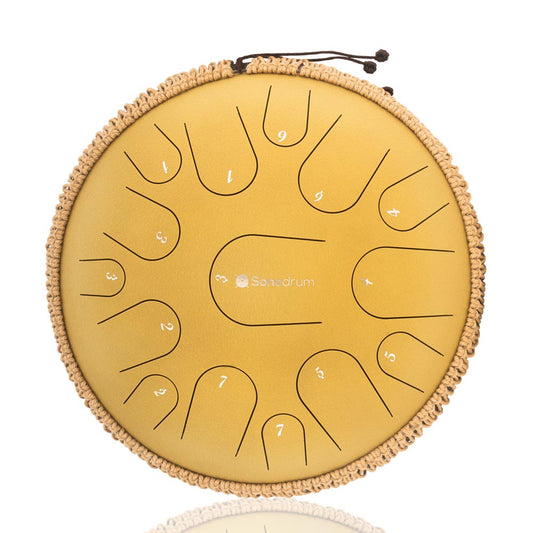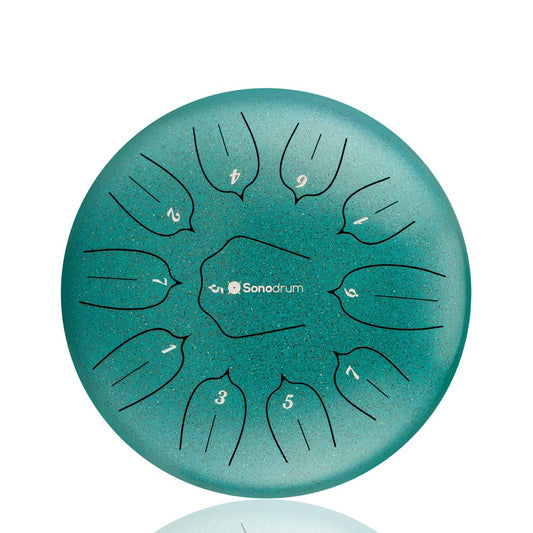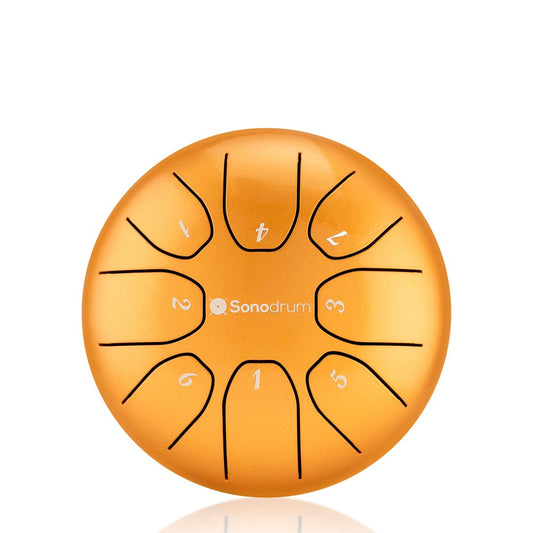Drums come in many different shapes and sizes, including tongue drums, snare drums, handpans, and bongos, to name just a few. Each drum produces a unique sound depending on its size, the material used, and the playing technique.
Furthermore, drums also hold social and ritual significance. In many cultures, they are used in festive occasions, religious ceremonies, and dance events to strengthen a sense of community and cultural identity.
Overall, the drum is a fascinating musical instrument with a rich cultural history and diverse musical possibilities, playing a significant role both as a solo instrument and in collaboration with other instruments. Small children enjoy drumming, and this enthusiasm often continues into adulthood.
At Sonodrum, we offer drums for every age and need. Let's take a closer look at these instruments today, so you can find the right drum for your personal needs. Enjoy reading.
What is a drum?
Drums are utensils that have been used for centuries in various cultures around the world. Percussion instruments, drums belong to the group of membranophones as they have a vibrating membrane that produces sounds when struck or rubbed. They essentially consist of a cylindrical body, usually made of wood, metal, or plastic. The striking surface, the membrane, can be made of animal skin, plastic, or other materials. There are now countless types of drums.
Drums not only have musical significance but also play an important role in the social and ritual contexts of many cultures. Their use goes beyond mere musical entertainment and serves as a link between people and their community.
In many traditional societies, percussion instruments like drums have a central function in ceremonies and celebrations. They are often used in religious rites, weddings, initiation rituals, and other festive occasions. Drum sounds can create a special atmosphere and influence the emotions of the participants. They can convey joy, sorrow, ecstasy, or reverence, deepening the sense of togetherness and spiritual unity.
In some cultures, drummers take on a spiritual role and are seen as intermediaries between the physical and spiritual worlds. Their rhythms and patterns can serve as a means of communication with gods or ancestors and are considered sacred.
In some cultures, drumming is also used as a form of meditation or trance induction. Through repeated rhythmic patterns, drummers and listeners can enter a state of deep concentration and spiritual immersion.
Drums are often used in ensembles and bands, playing a crucial role in various music genres such as rock, jazz, Afrobeat, Latin rhythms, and traditional folk music. They not only provide the beat and tempo of the music but also allow for the creation of complex rhythms and nuances that define the character of a musical piece.
Purchasing Drums - What to Consider?
When you're thinking about buying a drum instrument, there are several important aspects to consider to ensure that you get a high-quality instrument that meets your needs. Below are some points to keep in mind when looking to 'buy a drum':
-
Drum Type There are various types of drums, such as bass drums, snare drums, tom-toms, djembes, bongos, and more. Each type produces different sounds and has specific applications. Choose the drum type that best suits your needs or consider a smaller drum if it's for children. Kids love drums, but they may have difficulty handling a large one.
-
Purpose and Skill Level Think about what you want to use the drums for. Are you a beginner or an experienced player? Depending on your skill level and musical ambitions, you should select the appropriate instrument from among the different drum types.
-
Material Pay attention to the material used in the drum instrument. Traditional drumheads are often made from animal skin, while modern drums often use synthetic heads. Wood, metal, or plastic are common materials for the drum body. The material can influence the sound and durability of the drum.
-
Craftsmanship and Durability Examine the craftsmanship before purchasing a drum and ensure that it is sturdy and durable. Poor quality can lead to rapid wear and affect the sound.
-
Sound Quality Try to play the drum before buying it to assess the sound quality. Pay attention to resonance, sustain, and overtones. Good sound quality is crucial for achieving your musical goals.
-
Price Compare the prices of different drums and make sure that the price-to-performance ratio is reasonable. Be careful not to choose the cheapest option without considering the quality. You can find some particularly good drums here.
-
Brands and Reviews Research different brands and read customer reviews to learn more about other buyers' experiences with the product. You can do that at Sonodrum as well.
-
Accessories Check if accessories like sticks, bags, or stands are included in the purchase or if you need to buy them separately. Other extras like music books can also be interesting.
By considering these factors, you can ensure that you choose the right drums for your needs and will have long-lasting enjoyment with your musical companion. There are also plenty of options available for children's drums.
Drum Instruments in Review - How Good Are Our Drums?
As drum instruments under review, our drums, whether small or large, have proven to deliver impressive performance and sound quality. The careful selection of materials and high-quality craftsmanship have resulted in sturdy and long-lasting instruments. Sound quality has been rated as excellent, with clear tones, good resonance, and a variety of tonal nuances. The drums have proven to be reliable musical companions for both beginners and experienced players. Their price-to-performance ratio has also been highlighted positively, making them a recommended choice for all music enthusiasts.
Handpan
As a handpan, a fascinating musical instrument, it combines the beauty of a steel drum with the playability of a sonopan. The handpan produces meditative, harmonious sounds and offers diverse musical possibilities. It is compact, portable, and appeals to both beginners and experienced musicians. However, it is not suitable as a drum for children due to its relatively large size.
Tongue Drum
The tongue drum is a special percussive instrument with metal tongues that produce melodic sounds when struck. It is easy to play and provides a calming and meditative effect. The versatility of the tongue drum allows musicians to create different sound patterns and use it in various music styles. It is a small drum, ideal for children's hands.
Lotus Drum
As a lotus drum, it is a unique handpan-like instrument that offers a calming and meditative sound quality. With a fascinating flower-like design, the lotus drum produces melodic tones. Players can explore the different sound zones and enjoy a soothing musical experience.
Steel Tongue Drum
The steel tongue drum is a unique and melodious drum instrument. Its steel tongues produce gentle and calming sounds that are easy to play. The steel tongue drum is appreciated by musicians and meditation practitioners alike, allowing for a creative and meditative musical experience.
Hand Drum
The hand drum is a traditional percussive instrument that is struck or rubbed with the hands. It can be made from various materials like wood, metal, or plastic and produces a variety of rhythmic sounds. The hand drum is used in different music styles and cultural contexts and is easy to play.
Sound Drum
The sound drum is a fascinating musical instrument with a unique sonic characteristic. Striking or stroking the metal tongues produces harmonious and soothing tones. The sound drum is often used for meditation, relaxation, and musical improvisation, offering a rich tonal diversity for players and listeners alike.
Proper Drum Care
Proper drum care is crucial to maintain its longevity and sound quality.
- After playing, you should clean the drum of dirt, sweat, or moisture to prevent corrosion.
- Store it in a dry environment and protect it from direct sunlight or extreme temperatures.
- Use suitable protective covers or cases to avoid scratches or damage, especially during transportation.
- Ensure that the drum is correctly tuned and regularly tune it.
- Be gentle when playing the drum to prevent deformation or cracking.
With loving care, your drum will bring you joy for many years.
Benefits of Drum Instruments
Drum instruments offer a variety of advantages that make them popular and versatile musical instruments. Some of the key benefits include: Versatility:
There is a wide range of drum types, including bass drums, snare drums, handpans, tongue drums, and more.
Each instrument offers different sounds and allows musicians to explore various styles and genres.
Rhythmic Foundation: Drums serve as the rhythmic foundation in music.They provide the beat and tempo, helping to stabilize the musical structure.
Stress Reduction: Drumming can have a calming and meditative effect. It helps reduce stress and promotes relaxation and emotional expression. Physical and
Cognitive Benefits: Drumming requires hand-eye coordination, a sense of rhythm, and concentration. It can improve fine motor skills and cognitive abilities.
Community Experience: Drumming together in groups or bands fosters teamwork and a sense of belonging. It strengthens social connections and allows musicians to interact harmoniously.
Creative Expression: Drumming allows musicians to creatively express themselves and convey their emotions and thoughts through sounds and rhythms.
Cultural Significance: Drum instruments hold deep cultural significance in many cultures and are used in ceremonies, festivals, and ritual events to honor tradition and heritage.
Conclusion
In conclusion, it can be said that drum instruments play a significant role in music and culture. From small drums like the children's drum to large drums like the bass drum, they offer a variety of sounds and styles, making them an indispensable part of many music genres. Handpans and tongue drums expand the musical spectrum and provide a profound, meditative, and relaxing experience.
When choosing the right drum instruments from Sonodrum, it is important to consider individual needs and the intended use. The diversity of handpans, steel tongue drums, and other instruments from Sonodrum offers a wide range of options for musicians of all ages and skill levels. High-quality materials and careful craftsmanship ensure long-lasting sound quality and a fulfilling musical experience.
With their versatile applications and positive effects on the body and mind, drums remain a source of joy and inspiration for musicians and listeners alike.
FAQs
What is a Drum?
A drum is a percussive musical instrument with a vibrating membrane that is generated through strikes or friction. It sets the rhythm and tempo in music and offers a wide range of sounds and styles. Drums are used in various cultures and music genres.
What Types of Drums Are There?
There are various types of drums, including the small drum, the large drum (bass drum), handpans, tongue drums, bongos, children's drums, congas, frame drums, and many more. Each type of drum has its own sound quality and uses in different music styles and cultural contexts.
How Do You Play a Drum?
To play a drum, you can use your hands or drumsticks, depending on the type of drum. Hands are often used to play handpans, djembes, and frame drums. Drumsticks are suitable for drums like snare drums, bass drums, and steel tongue drums. Striking or stroking the membrane produces rhythmic and melodic sounds.
What Music Genres Use Drums?
Drums are used in a variety of music genres. They are an essential part of rock, pop, jazz, blues, Latin, Afrobeat, reggae, folk, and world music. They are also frequently used in traditional and ethnic music styles to emphasize rhythmic and cultural elements.
Can I Learn to Play Drums as a Beginner?
Yes, absolutely! Anyone can learn to play drums, regardless of their skill level. There are beginner courses and teaching materials that can help you get started. With patience, practice, and a teacher or online tutorials, you can learn the basics of drumming as a beginner and develop your skills.
What Accessories Do I Need for Drumming?
The accessories you need for drumming depend on the type of drum. For drum kits, you'll need drumsticks and possibly a drum set. Handpans or steel tongue drums do not require sticks. Protective covers, stands, bags, and music stands can also be helpful but are not always mandatory.
Can I Pursue Drumming as a Hobby or Are There Professional Career Opportunities?
Yes, you can pursue drumming as a hobby and simply play for joy and passion. There are also professional career opportunities for drummers, such as studio or live musicians, in bands, orchestras, or as music teachers. It depends on your interests and goals how you want to engage in drumming.
How Do I Care for and Maintain My Drum?
To properly care for your drum, regularly clean it from dirt and moisture and store it in a dry place. Avoid direct sunlight and extreme temperatures. Make sure the drum is correctly tuned and tune it if necessary. Be mindful of playing it gently to prevent damage.




